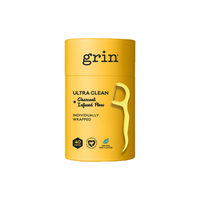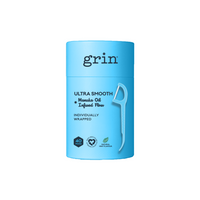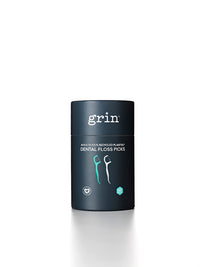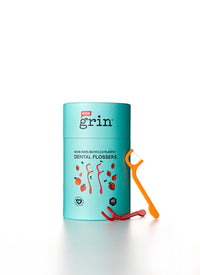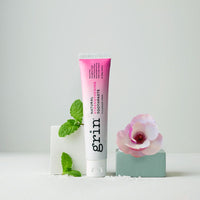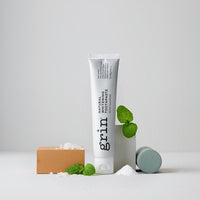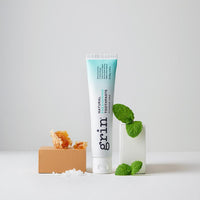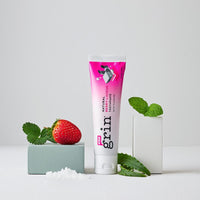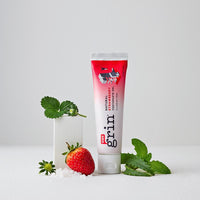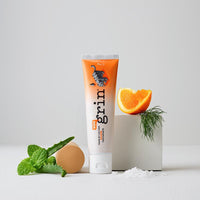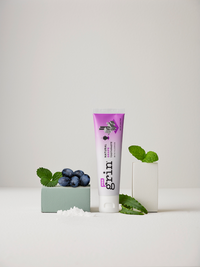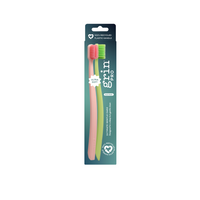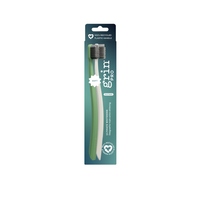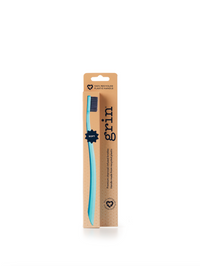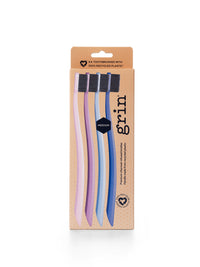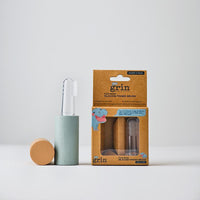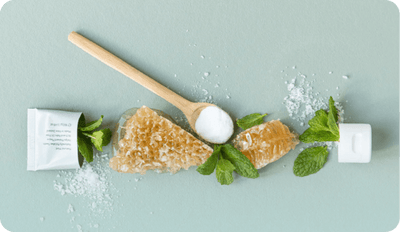Why Natural Toothpaste
At Grin we’re all about what we leave in, what we leave out, and how we leave your teeth. Our formulation is 100% natural, and can be used to help prevent tooth decay and to help keep the mouth healthy - because toothpaste needs to get the job done.
|
Ingredient |
What is it? |
Health Benefit |
|
Propolis |
Often referred to as “bee glue”, propolis is resinous mixture that honey bees collect from tree buds, sap flows, or other botanical sources. |
Propolis offers antiseptic properties to help keep the mouth healthy. |
|
Manuka Oil |
Extracted from the leaves and small branches of the Manuka tree (Leptospermum scoparium), which is native to New Zealand. |
Studies suggest that the anti-septic activity of Manuka Oil may help in the management of good oral health. |
|
Organic Sea Salt |
When salt is certified organic the certification refers to the process of collection of sea salt. |
Regular rinsing and gargling with tepid sea salt water helps to manage oral hygiene and to soothe an irritated mouth. |
|
Fennel |
A flowering plant species in the carrot family. Fennel is a hardy, perennial herb with yellow flowers and feathery leaves. |
Fennel has been in use in culinary applications and as a mouth freshener since ancient times. |
|
Menthol |
A organic compound made synthetically, or obtained from corn mint, peppermint or other mint oils. |
Used to help with soothing an irritated mouth or throat. |
|
Spearmint |
A herbaceous perennial plant with a square-shaped stem, broad leaves, and white/pink flowers. |
Helps keep your mouth and throat cleaned and effective dental and gum health. |
The Goodness in Grin
- No nasties
Grin Toothpaste contains NO sodium lauryl sulfate, NO preservatives, NO artificial colours, NO artificial flavours, NO fragrance and NO harsh abrasives.
- Healthy Gums
Our formula contains organic sea salt—a natural antiseptic that helps keep the gums healthy. Manuka oil and propolis also lend their anti-antiseptic properties to help keep gums healthy.
- Removes plaque
We’ve included propolis extract to reduce supragingival plaque. Organic sea salt also provides a gentle abrasive effect to help prevent plaque build-up.
- Combats
Manuka oil holds potent antiseptic, shown to be effective in helping the balance of good and bad bacteria in mouth. .
- Reduces tooth decay
Grin’s potent trio of active ingredients work together to reduce plaque, alkalanise the mouth and promote healthy gums—creating a clean, healthy environment that reduces the risk of tooth decay.
- Freshens breath
Our active ingredients provide an effective clean, while natural spearmint, peppermint and fennel extracts leave your mouth with the minty freshness you expect after a good brush.
Our commitment
Our commitment you is also defined by the ingredients we avoid.
- Sodium Lauryl Sulfate
We do not use SLS (short for Sodium Lauryl Sulfate), which is a common component of ordinary toothpastes. This chemical compound does not actually clean teeth—its sole purpose is to produce foam, which only gives the impression of cleaning. In some people, it can cause skin irritation.
- Fluoride
We do not add fluoride, although it is used in many commercial toothpastes.
- Artificial Colours
Because we do not add artificial colours, the appearance of our products may vary from batch to batch.
- Artificial Flavours or Fragrances
We do not use any synthetic flavours or fragrances—we prefer a fresh, natural taste and are sure you will, too!
- Artificial Preservatives (EDTA, Formaldehyde, Parabens, Etc.)
Natural preservatives work as well, if not better, than artificial alternatives.
- Animal Ingredients
Our support of non-animal-testing models also includes the belief that we don't need to use animal ingredients to create effective products. For example, glycerin used in toothpastes and soaps is often made from animal ingredients, but ours is vegetable-based.
- Saccharin Or Other Artificial Sweeteners
Many conventional toothpastes contain artificial sweeteners. In Grin Natural toothpaste, we rely on the natural sweetness of xylitol, spearmint and fennel.
References
CDC, (2012) Prevalence and Severity of Dental Flourosis in the United States, 1999-2004. U.S. Department of Health and Human Services.

